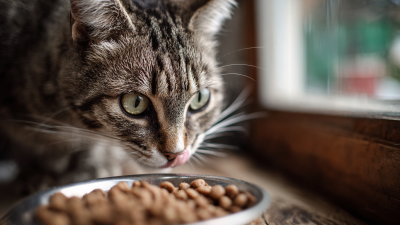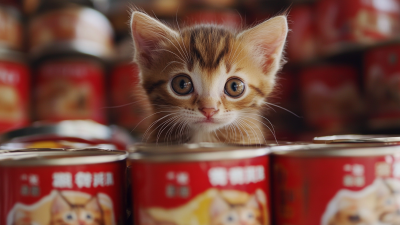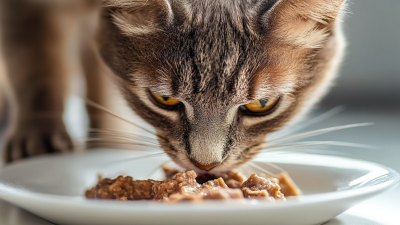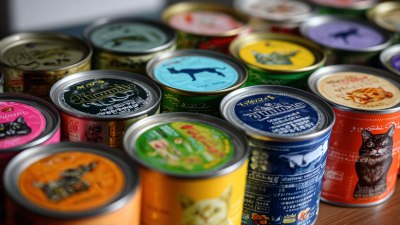Choosing the best canned cat food for your feline companion is a decision that reflects your commitment to their health and well-being. With a staggering 45% of cat owners in the U.S. opting for canned food as their primary source of nutrition for their pets, it's vital to understand what constitutes high-quality options in this market. According to a recent report by the American Pet Products Association, the canned cat food segment has grown significantly, driven by a rising awareness of the nutritional benefits and palatability that these products can offer.
Industry expert Dr. Emily Chen, a respected veterinary nutritionist, emphasizes the importance of selecting the right canned cat food: "A well-balanced canned diet can offer not only hydration but also essential nutrients that contribute to a cat's overall health." With various brands and formulations available, understanding ingredients, nutrient profiles, and potential health benefits is crucial.
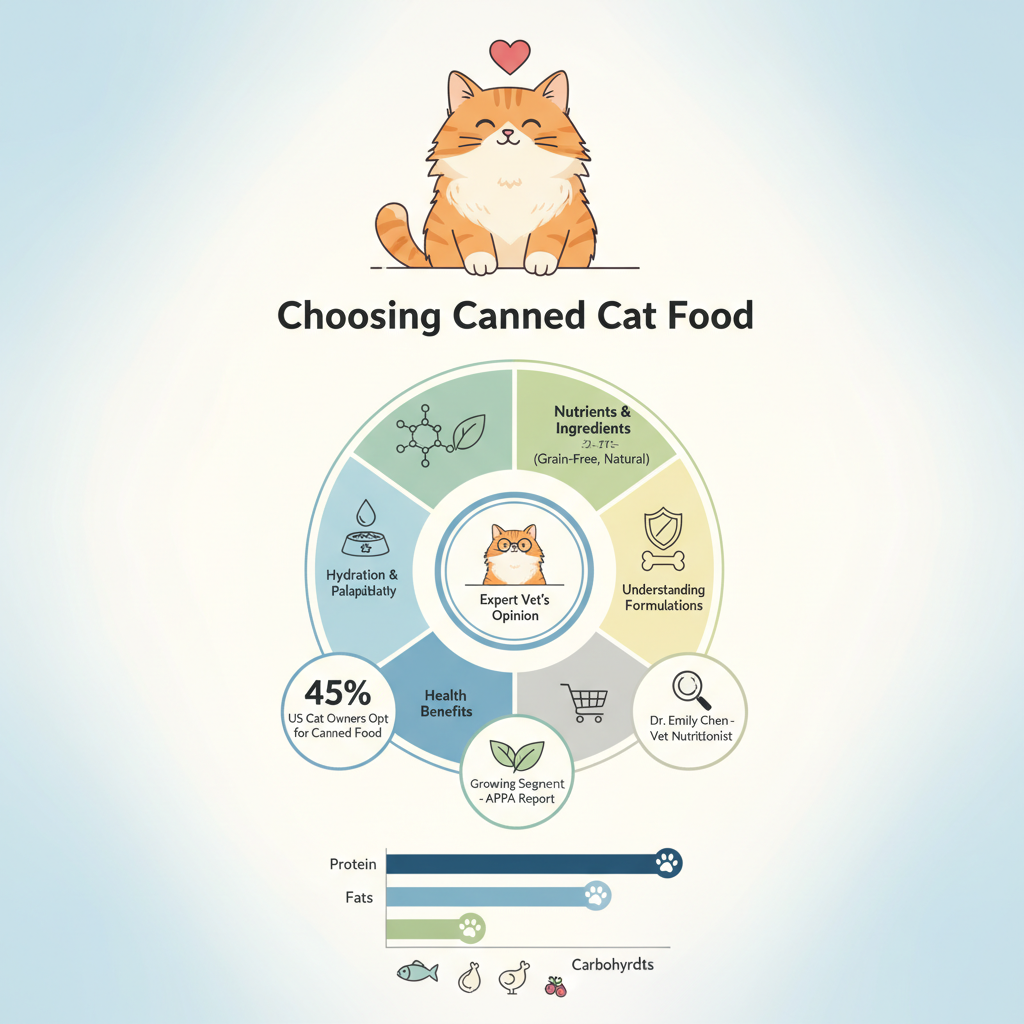
Moreover, the growing trend towards grain-free and natural ingredients in canned cat food reflects consumers' desire for healthier options that align with their pets' evolving dietary needs. As we explore how to choose the best canned cat food, we will delve into the key factors that can help you make an informed decision for your beloved feline.
When selecting the best canned cat food for your feline friend, it is essential to understand their unique nutritional needs. Cats require a diet that is high in protein and fat, as they are obligate carnivores. The right canned food should contain real meat as the primary ingredient, along with essential vitamins and minerals that support their overall health. Additionally, hydration is a critical factor in a cat's diet, and wet food provides an excellent way to increase their water intake, which can prevent urinary tract issues and promote kidney health.
In recent years, pet owners have become more conscious of their pets' diets, often opting for homemade meals or high-quality canned options that ensure balanced nutrition. As the trend towards healthier pet feeding choices rises, it is crucial to evaluate the ingredient lists and nutritional information on labels. Look for products with whole food ingredients and those that meet the guidelines set by pet nutrition experts. By prioritizing your cat's nutritional needs and opting for quality canned food, you can significantly contribute to their long-term health and well-being.

When selecting the best canned cat food for your feline friend, it’s essential to evaluate the ingredients and quality standards meticulously. According to the Association of American Feed Control Officials (AAFCO), a complete and balanced diet for cats must contain a minimum of 26% protein and a maximum of 9% carbohydrates in dry matter. Therefore, the first few ingredients listed on the can should ideally be high-quality protein sources, such as real meat or fish, which are crucial for maintaining muscle health and supporting overall wellness.
Furthermore, it is important to consider the sourcing and safety standards of the canned food. The Pet Food Institute reports that approximately 95% of pet food sold in the United States is made domestically, with stringent safety regulations that ensure high-quality standards. Look for brands that provide transparency about their ingredient sourcing and manufacturing processes, as this often correlates with better quality and safety. Additionally, certifications from organizations like the Global Animal Partnership (GAP) can indicate higher welfare standards in ingredient sourcing, giving cat owners peace of mind regarding the food they provide to their beloved pets.

When selecting the best canned cat food, it's crucial to compare the various brands and types available on the market. Different manufacturers utilize unique formulas, resulting in varying nutritional profiles that cater to specific needs. For instance, some brands prioritize high protein content, essential for active cats, while others focus on high moisture levels to promote hydration, which can be particularly beneficial for cats prone to urinary issues.
Reading the ingredient list is essential, as the quality of meat sources and the absence of fillers can significantly impact your cat's overall health.
Besides nutritional differences, it's also worth considering the texture and flavor varieties offered. Cats can be finicky eaters, and providing a mix of pâté, chunks, or gravy can help keep mealtime interesting. Some brands also offer specialized recipes to address specific health concerns, such as weight management or sensitive stomachs. Conducting a side-by-side comparison of these options can aid in determining what best suits your feline friend’s tastes and health requirements, ensuring that mealtimes are both enjoyable and nutritious for them.
When selecting the best canned cat food, it's essential to take into account your feline friend's age, health status, and individual preferences. Kittens, for example, require higher protein and fat content for their rapid growth and energy needs. According to a study by the Association of American Feed Control Officials (AAFCO), kitten-formulated foods should contain at least 30% protein and 9% fat. Choosing food with these specifications can significantly aid in their development.
Moreover, the health of your cat plays a crucial role in food selection. Cats with specific health conditions, such as kidney disease or diabetes, may need specialized diets. Research published in the Journal of Veterinary Internal Medicine highlights that diets lower in phosphorus and protein while being higher in moisture can benefit cats with compromised renal function.
Additionally, understanding your cat's flavor preferences is equally important, as scent and taste greatly influence their willingness to eat. Offering a variety of textures and flavors can help ensure they maintain a healthy appetite, ultimately contributing to their overall well-being.
When it comes to selecting the best canned cat food, one of the most critical steps is understanding how to read labels effectively. Nutritional information on cat food labels can often be overwhelming, but breaking down key components can make it easier. A report by the Association of American Feed Control Officials (AAFCO) asserts that a complete and balanced diet for cats should ideally have at least 26% protein and 9% fat on a dry matter basis. Therefore, when scanning labels, pet owners should prioritize these macronutrients to ensure their feline friend receives adequate nutrition.
Additionally, claims such as "all-natural," "grain-free," and "organic" can be misleading without appropriate context. For instance, the Pet Food Institute highlights that “grain-free” diets can sometimes replace grains with other carbohydrate sources that may not be ideal for all cats. Knowing the ingredients listed on the label can help pet owners avoid potential allergens and select quality foods. Choosing products with named meat sources, like "chicken" or "beef," as the first ingredient generally indicates a higher-quality protein source, leading to healthier cats.
